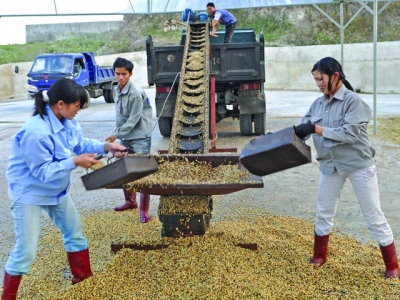Trade treaty with EU to benefit Vietnams agriculture

The EU-Vietnam Free Trade Agreement (EVFTA), signed this past June and due to take effect in 2020, is expected to boost Vietnam’s exports to the EU market. This agreement is considered a great opportunity for Vietnam to promote its agricultural products in discerning markets. European Chamber of Commerce in Vietnam (EuroCham) Vice Chairman Ywert Visser discussed the issue in an interview with Nguyen Huong of Vietnam Economic News.
How do you foresee two-way trade growth once the EVFTA takes effect?
The EU market is large and high-spending with about 500 million people. When the EVFTA takes effect, Vietnamese businesses will have a great opportunity to promote exports to the EU because of a reduction in tariffs, especially on items such as rice, sugar, coffee, and dairy products.
EU exports to Vietnam are also expected to grow strongly - about 29 percent by 2035, while Vietnam’s exports to the EU are projected to increase by about 18 percent.
According to a Vietnam Chamber of Commerce and Industry (VCCI) report, nearly 70 percent of Vietnamese businesses do not understand the EVFTA. How do you view the problem?
Many businesses do not understand the EVFTA well despite the importance of doing so in order for them to be ready to take advantage of opportunities it will provide. The EU is very demanding in terms of compliance with standards, unique characteristics and geographical indications. Therefore, Vietnamese businesses that meet EU standards will have an advantage once the EVFTA comes into effect.
Can Vietnam’s exports compete with products of other countries in the EU market?
The products with protected geographical indications (GI), such as Phu Quoc fish sauce and Moc Chau tea, face great opportunities in the EU, where they will be recognized and protected, encouraging consumer confidence and facilitating greater sales in the future. However, exporters need to focus on advertising Vietnamese products in the EU market.
The EU has always been an important trading partner for Vietnam, and vice versa, giving Vietnam a competitive advantage compared to other countries in the region. EU investors will be more confident about investing in Vietnam or purchasing Vietnamese goods, while Vietnamese exporters will be provided with more opportunities to access the EU market.
Could you tell us more about cooperation opportunities between the EU and Vietnam in agriculture?
Agriculture is one of the high potential areas of EU-Vietnam cooperation. Vietnam can make the most of European advantages, such as technologies and cultivation techniques, while European consumers are interested in Vietnamese seafood and agricultural products such as tea, coffee, cocoa, and spices. In fact, while the volume of Vietnam’s agricultural exports to the EU remains low, it is expected to increase strongly under the trade treaty. Cooperation will benefit the two sides. EU businesses, which order Vietnamese agricultural products, will generate a stable income for Vietnamese farmers. And Vietnam can make the most of European technologies and techniques in cultivation in order to drive towards more sustainable production.
The EU has high standards for imported food, so it is essential for EU businesses and Vietnamese producers to work together to develop safe and certified products.
What are your recommendations for Vietnamese businesses?
When the EVFTA takes effect, Vietnamese goods will become more attractive because of a reduction in tariffs and will be more competitive compared to products of other countries that do not have free trade agreements with the EU.
The EU has high standards for imported goods to protect their consumers. Therefore, Vietnamese businesses must understand the trade pact and rules of origin if they want to export their goods to the EU.
As long as Vietnamese goods can meet the EVFTA requirements, such as rules of origin, GI, and sanitary and phytosanitary (SPS) measures, Vietnamese businesses will have a great opportunity to grow strongly.
Related news
 Coconut offers high value for farmers amid climate change
Coconut offers high value for farmers amid climate change Climate change has affected crop yields in the country but coconut can adapt and offer high value to farmers, experts have said.
 Expand VietGAP orange area in Cao Phong district
Expand VietGAP orange area in Cao Phong district With the increasing sense of responsibility, Cao Phong orange growers in Hoa Binh province have actively applied good agricultural practices to produce clean
 Long An: In 2020, growth rate of Agriculture strives to reach 1.5%
Long An: In 2020, growth rate of Agriculture strives to reach 1.5% On November 15, the Department of Agriculture and Rural Development of Long An province held a conference to summarize agricultural production in 2019